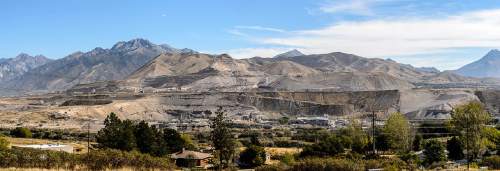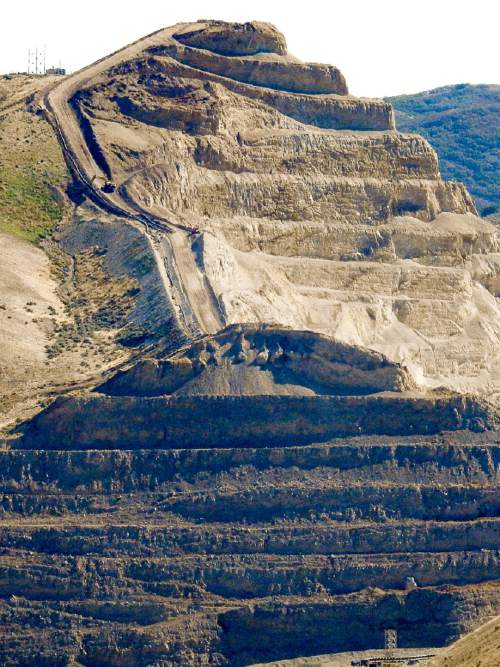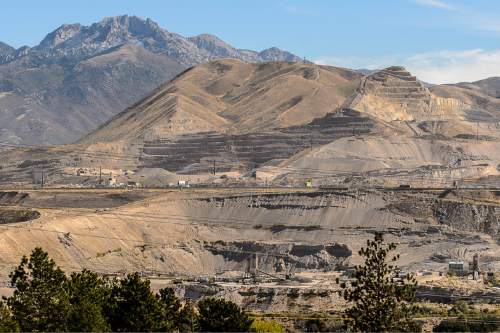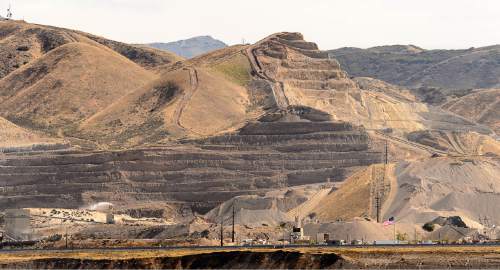This is an archived article that was published on sltrib.com in 2015, and information in the article may be outdated. It is provided only for personal research purposes and may not be reprinted.
Geneva Rock has withdrawn its application with Draper City for a controversial plan to rezone 189 acres it owns at Point of the Mountain to expand longstanding gravel-mining operations, but residents who opposed the proposal say this doesn't put the issue to rest.
Residents had cited concerns over airborne dust and potential health impacts. Other issues raised dealt with adversely impacting the flight park popular with hang gliders at the Point of the Mountain.
The company's withdrawal eliminated the need for a highly anticipated November public hearing, in which residents like Adrian Dybwad planned to argue against the company's expansion.
"We feel pretty guarded. It's not a victory or anything like that for us," he said, speculating that public opposition is the reason the company backed off.
Geneva Rock President Jim Golding said in a prepared statement that "We take concerns raised by local officials and residents very seriously, and we want to have adequate time to resolve them. Once these issues are "adequately addressed" the company statement said, "Geneva Rock intends to re-file its rezoning application and go through the public approval process."
Mayor Troy Walker and City Council members in a news release said they "shared many of the concerns that were raised by Draper residents regarding this rezoning."
Had Geneva Rock's rezoning request, already OK'd by the Planning Commission, been rejected by the city council, the company would have had to wait a year before resubmitting a proposal. By withdrawing its application, it can reapply at any time, although it would essentially have to start the process over, including separate public hearings before the Planning Commission and City Council.
Dybwad worries the withdrawal was a "strategic move" on the part of the company to avoid a mandatory one-year wait.
Maridene Alexander, the public information officer for Draper City, said the city had no information on the company's reasons for pulling its application.
Dybwad said stopping the rezoning was one of many issues he has with the company's mining operation. Previously, he contacted the state Division of Oil, Gas and Mining about allegations the company was operating outside its permitted area. The division, after a brief investigation, issued a cessation order for work outside the authorized area.
Dybwad said he also has complained to the Utah County attorney's office — Point of the Mountain straddles Salt Lake and Utah counties — along with the School and Institutional Trust Lands Administration, which owns some mineral rights on the mountain; the Environmental Protection Agency's criminal investigation division; and the Mine Safety and Health Administration.
The main concern of residents is the dust that blows off the ongoing mining operation — and he took those concerns to the state Air Quality Board, where officials confirmed there are no air-monitoring stations near Point of the Mountain.
Kent Bott, an environmental scientist with the Division of Air Quality (DAQ), said the closest stations to the mining site are at Hawthorne Elementary School in Salt Lake City and in Herriman, but neither would provide accurate information about air at Point of the Mountain.
"Why we're not there is multifaceted," Bott said in an interview Wednesday. "First and foremost: money."
Even the smallest monitoring stations require $60,000 to $70,000 "just to install," he said. On top of that, there are operating costs and expenses.
He said the EPA is constantly increasing required programs, and the state's DAQ has a difficult time keeping up.
"The EPA is really good at issuing unfunded mandates to states," Bott said.
Because the state needs federal approval of implementation plans for reducing air pollution, he said, EPA programs take priority while other projects sit on the back burner.
Finances are the single biggest obstacle to monitoring air quality near Point of the Mountain. "There are other issues too," he said, "but they're more in the realm of politics, which I don't do."
Bott said "it might be a good idea" to have a monitoring station near the mining sites, but for that to happen, he said residents might want to reach out to the state Legislature.
Dybwad said residents have yet to take that step, but would be willing to do so. In the meantime, he and other residents are "implementing some dust monitoring of our own," placing air monitors they've purchased "in houses around" the site.
"We believe that this is far from over," Dybwad said.











